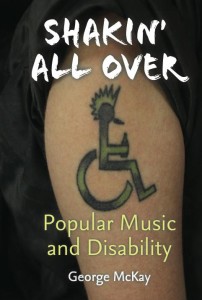 I write about this song by US country singer and songwriter Hank Williams in the context of a question: (how) can the voice sing the disabled body? It’s in a chapter called vox crippus, in which, among other versions of mal canto, I present a new reading of falsetto.
I write about this song by US country singer and songwriter Hank Williams in the context of a question: (how) can the voice sing the disabled body? It’s in a chapter called vox crippus, in which, among other versions of mal canto, I present a new reading of falsetto.
Williams, among many other things, from wasted legend to cowboy crip, was a notorious yodeller. Williams’s spina bifida occulta, though generally the least serious of the types of spina bifida birth defect, would give him constant back pain in his short adult years. His hectic and excessive lifestyle in the early 1950s—constant touring, alcoholism, narcotic consumption, poor diet, failed back surgery, regular enforced stays in sanatoriums, and, towards the end, wearing an orthotic ‘chrome-and-leather back brace’ while suffering from chest pains, near impotence and incontinence (he was 29 years old when he died) —did nothing to alleviate and feasibly aggravated his condition. Hank’s bucket had a lot of holes in it.
The single on release at the time of his death in 1952 or 1953 (late New Year’s Eve or early New Year’s Day) was ‘I’ll never get out of this world alive’, which includes a surprisingly (bearing in mind the title) witty lyric that manages to sneak in the observation that, actually, ‘nothing’s ever gonna be all right’. On record, Williams’s musical accompaniment usually included the Hawaiian steel guitar, placed high up in the recording mix so it could be heard on radio and juke boxes, with its ‘sliding whine that …[was] the perfect complement to, and a virtual echo of, the tortured voice’. Indeed the counterpoint of the steel guitar made it ‘the most important element in Hank’s accompaniment, a delicate echo of his mournful cry’ (Hemphill 2005, 31, 97). Williams’s regular use of the yodel in his recordings includes him in seeming satiric self-referential mode on ‘Howlin’ at the moon’ (1951). Here he is in the character of a lovesick howling dog, with an inhuman howl, trying, as the lyric puts it, ‘to quit my doggish ways’. (Williams was, after all, as he sang elsewhere, a man not born but ‘hatched’.) We can hear in the opening line of ‘Howlin’’ not just a nod to the ‘doggish’ narrative to come, nor only too an acknowledgement of the ravages of his excessive and chaotic current personal lifestyle—but also the recognition of the experience of his own corporeality, born with spina bifida: ‘I know there’s never been a man in the awful shape I’m in’. The upper register howl at the ends of verses on ‘Howlin’’ also concludes the song itself, and is—as befits the falsetto—the unnatural, dehumanised, sound of deformity, one more ‘non-voice’ in the high crip realm.
